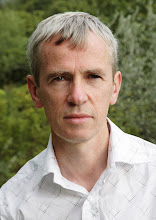Sunday, July 10, 2011
Tuesday, July 05, 2011
Thirty-one years later
Sunday, June 19, 2011
Thursday, June 02, 2011
Dr Steiner of Geneva
 My friend Percy P. has recently responded to an article of mine in Poetry Ireland Review on 'Eco-poetry'. (See georgiasam.blogspot.com.) His generous response includes a hostile appraisal of George Steiner, whom I had quoted at the end of my piece in order to locate an idea of mystery at the heart of meaning in language. I knew that reference to Steiner was a risk, because of the extremes of irritation and admiration he usually provokes. So here's a little apologia for my reference to the polymath:
My friend Percy P. has recently responded to an article of mine in Poetry Ireland Review on 'Eco-poetry'. (See georgiasam.blogspot.com.) His generous response includes a hostile appraisal of George Steiner, whom I had quoted at the end of my piece in order to locate an idea of mystery at the heart of meaning in language. I knew that reference to Steiner was a risk, because of the extremes of irritation and admiration he usually provokes. So here's a little apologia for my reference to the polymath: I was introduced to GS by an American friend in the late seventies; she lent me a copy of Extraterritorial, his analysis of the outsider status of many leading modern writers and artists. After that I read Language and Silence, a collection of early essays, and After Babel, his study of language and translation. I could add a few more GS titles to my list, such as Real Presences, Errata, and the essay on Heidegger in the Fontana Modern Masters series. On the other hand, I never managed to get to his early books on the Russian novelists Tolstoy and Dostoyevsky and on the death of Tragedy. While I was drawn into several passages of Antigones, I did not read it in its entirety.
During my days at UCD studying French and English, Continental culture was mainly represented by critical theory; the Anglo-American academy looked nervously on while whole swathes of scholarship were taken over by the 'radical' discourse of theory. Steiner's voice was singular and obstinate in the middle of all of this. Like many others, I was fascinated by the arguments, the range of reference, the alertness to historical cruelty and the regular raids on other fields such as music and linguistics.
Some time after this, during my Lehr- and Wanderjahre, I went to Geneva on a Swiss government scholarship and attended GS's winter seminar. On that occasion he was lecturing on English romantic poets and the French Revolution, with a particular focus on Wordsworth and Coleridge. I found the atmosphere in the seminar very stimulating: Steiner had a great feeling for the historical context as well as for the literary object. He also had a genius for anecdotes that illuminated the moment.
(to be continued...)
Saturday, May 28, 2011
J.A. Baker's book, The Peregrine
'Wherever he goes, this winter, I will follow him. I will share the fear, and the exaltation, and the boredom, of the hunting life. I will follow him till my predatory human shape no longer darkens in terror the shaken kaleidescope of colour that stains the deep fovea of his brilliant eye. My pagan head shall sink into the winter land, and there be purified.' p. 42
Wednesday, April 20, 2011
New arrivals
Thursday, March 10, 2011
Recent purchases
Subscribe to:
Posts (Atom)

